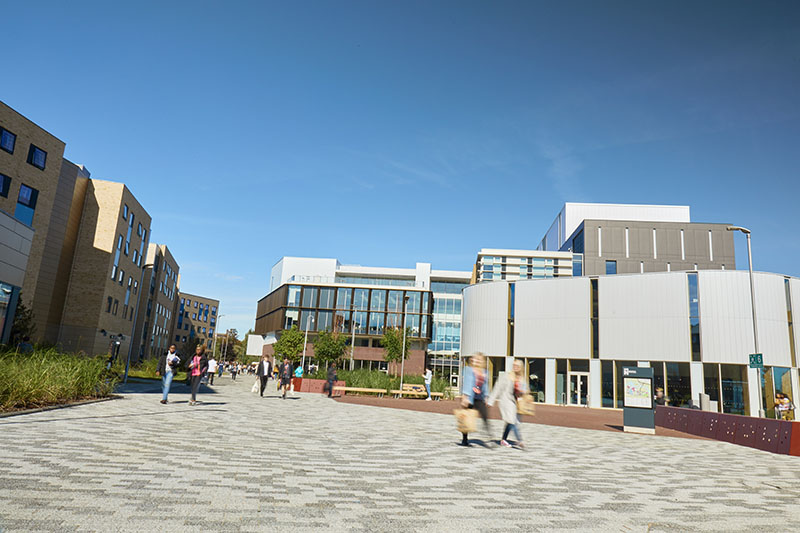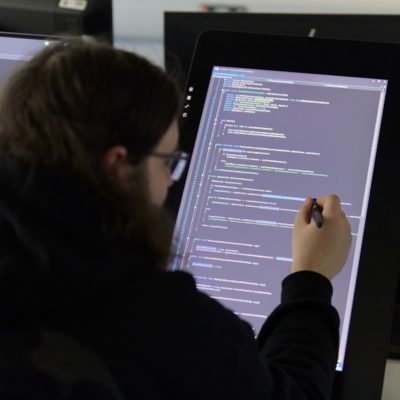Computing (Computer Networks Engineering) MSc
- Home
- Courses by subject
- Computing (Computer Networks Engineering) MSc
Key Facts
-
Level
Master'sPG
MSc -
Duration
Full Time: 1 year
Part Time: 2 years -
Starting
September, February
-
Fees UK 24/25
Full Time: £8,250
Part Time: £920 per 20 credit module -
Fees International 24/25
International: £16,995
-
Location
Get in touch
For questions regarding study and admissions please contact us:
Overview
With the University of Northampton’s Computing (Computer Networks Engineering) MSc course, you will have the opportunity to study computing in great depth. In addition to completing an individual thesis on an area of computer networks engineering that is of particular interest to you, this Computing (Computer Networks Engineering) course will also allow you to develop your research and analytical abilities. This will equip you with all the skills you need to enhance your career prospects further.
Embarking on a computer networks engineering course offers access to a realm of boundless possibilities in the digital age. In today’s interconnected world, this course is beneficial for those aspiring to build a career in the ever-evolving field of information technology. Within this programme, you will explore the fundamental principles of network architecture, data transmission, security, and management. You will be well-prepared to craft, execute, and sustain computer networks, ensuring uninterrupted connectivity and data flow. Whether your focus is in network administration, cybersecurity, or telecommunications, a computer networks engineering course equips you with the skills and expertise required to meet the dynamic and competitive job market’s demands.
Updated 13/06/2024
Highlights
- Develop analytical skills and business understanding to quickly identify market drivers.
- On the Computer Networks MSc pathway, you will learn the principles of SDN, Cloud networking, Network security and Systems architecture.
- You will familiarize yourself with wireless concepts and will work with cellular communication network architecture.
- Hands on experience on a modern networking lab, equipped with Aruba SND controllers and Cisco switches, routers and security devices.
Course Content
-
This programme encompasses a range of modules that delve into the core aspects of Computer Networks Engineering, ensuring you’re well-prepared for the dynamic job market. In the “Internet Security” module, you’ll gain a solid grasp of the principles surrounding computer and internet security, equipping you with the theoretical and practical knowledge needed to implement secure applications within the Internet environment. “Modern Computer Architecture” explores the intricate architecture of computer systems, from personal computers to multiprocessors, and their interaction to meet user processing requirements. “Computer Networks” module places a strong emphasis on practical networking skills and a deep understanding of network principles and protocols, emphasizing real-world problem-solving using the latest network technologies. Finally, our “Mobile Device Software Development” module is dedicated to creating software for mobile computing devices and addresses the technologies and software development techniques essential for seamless communication on these platforms.
The Computing (Computer Networks Engineering) programme is firmly rooted in the traditional tenets of modern computing programmes, and one of its standout features is the emphasis on cultivating a comprehensive understanding of programming skills. These skills serve as a vital foundation that is not only valuable within the realm of network engineering but also highly transferable across various technology domains. The ability to code and script efficiently is a cornerstone in crafting innovative and efficient solutions for the complex challenges that network engineers encounter. As a culmination of your journey, all the knowledge acquired throughout the programme converges in our comprehensive dissertation module. Here, you will have the opportunity to demonstrate your expertise by exploring and addressing real-world challenges, solidifying your place as a proficient computer networks engineer and programmer. Your journey in Computer Networks Engineering will be one of both knowledge and hands-on expertise, shaping you into a highly desirable asset in the competitive job market.
Please note the modules shown here relate to the academic year 23/24. The modules relating to the academic year 24/25 will be available from June 2024.
Please note the modules shown here relate to the academic year 24/25. The modules relating to the academic year 25/26 will be available from June 2025.
-
-
Intelligent Systems (20 Credits)
Module code: CSYM015Status: DesignateTo teach students the fundamental theory and practical applications of search methods and agents.The underpinning concepts will be introduced, followed by examples of how intelligent systems are used in applications on the Internet.
-
Databases (20 Credits)
Module code: CSYM017Status: CompulsoryThis module emphasises the importance of sound design using appropriate data modelling techniques (e.g. relational modelling, entity-relationship modelling).
-
Internet Programming (20 Credits)
Module code: CSYM019Status: DesignateThis module focuses on creating client and server side software as well as web applications for the World Wide Web us. It concentrates on the technologies used to allow such software to be designed, implemented and deployed.
-
Internet Security (20 Credits)
Module code: CSYM020Status: DesignateThe module introduces the key concepts of Computer and Internet Security. The module is designed to provide the student with the necessary theoretical and practical understanding of the technology available to manage and implement secure computer applications in an Internet environment.
-
Dissertation (60 Credits)
Module code: CSYM023Status: CompulsoryThis module provides the student with the opportunity to learn appropriate research techniques in order to carry out independent, relevant and in-depth research in a topic of specific interest.
-
Visual Object Software (20 Credits)
Module code: CSYM025Status: CompulsoryThis module concentrates on creating object-based solutions to software problems within a contemporary integrated development environment. It focuses on the concepts of object technology and the syntax and semantics of the underlying model while promoting good practice in software construction and testing.
-
Software Engineering (20 Credits)
Module code: CSYM026Status: DesignateThis module will provide consolidation and an extension of the skills, understanding and knowledge derived from an earlier module. More advanced topics will be studied in pursuit of robust re-usable and sophisticated design mechanisms. The main aim of the module will be to study in depth some of the major aspects of the various Design issues which impact on the building of the software systems.
-
Modern Computer Architecture (20 Credits)
Module code: CSYM028Status: CompulsoryThis purpose of this module is to consider the structure and behaviour of the various functional modules of the computer and how they interact to provide the processing needs of the user. This module covers systems ranging from PCs through multiprocessors with respect to hardware design and instruction set architecture.
-
Computer Networks (20 Credits)
Module code: CSYM029Status: CompulsoryComputer Networks module focuses on developing practical networking skills alongside deeper understanding of network principles and protocols (wired and wireless). Although the necessary background is introduced as appropriate, the course on the whole deals with problem-solving using current and emergent network hardware and protocols along with the development of applications to exploit these technologies
-
Mobile Device Software Development (20 Credits)
Module code: CSYM030Status: CompulsoryThis module focuses on creating software for mobile computing devices. It concentrates on the necessary technologies used to allow such devices to communicate and how to develop software to allow them to do so.
-
Intelligent Systems (20 Credits)
-
-
Computer Networks Engineering MSc applicants will normally hold a recognised first or second class honours degree from a UK university or international equivalent in a relevant subject. We expect that you will have a working knowledge of computers and networks and it is essential that you have practical hands-on experience of at least one programming language.
For information on how to apply to study with us, please see our How to Apply page.
English Language Requirements
All International and EU students applying for a course with us must meet the following minimum English language requirements:
- Minimum standard – IELTS 6.5 (or equivalent)
for study at master’s level.
For information regarding English language requirements at the University, please see our IELTS page.
- Minimum standard – IELTS 6.5 (or equivalent)
-
2024/25 Tuition Fees
Fees quoted relate to study in the Academic Year 24/25 only and may be subject to inflationary increases in future years.
- UK – Full Time: £8,250
- UK – Part Time: £920 per 20 credit module
- International – Full Time: £16,995
Additional Costs
There are currently no additional costs anticipated for this Computer Networks degree for 2024 entry.
2023/24 Tuition Fees
Fees quoted relate to study in the Academic Year 23/24 only and may be subject to inflationary increases in future years.
- UK – Full Time: £8,010
- UK – Part Time: £890 per 20 credit module
- International – Full Time: £16,500
Additional Costs
There are currently no additional costs anticipated for this Computer Networks degree for 2023 entry.
Master’s Loans
If you are starting a Master’s course in 2024/25 either full-time or part-time* you may be able to apply for a master’s loan through Student Finance England
*Please note that the maximum period of study allowed for part-time courses is two years.
For information on the scholarships available to you, please see our scholarships page.
For more information about possible funding options, please visit our Fees and Funding pages.
-
How will I be taught on the Computing (Computer Networks Engineering) MSc?
This pathway teaches students via a mix of theoretical lectures and seminars and more hands-on work. This includes the use of laboratory facilities and computer simulation tools, alongside learning from case studies and practical examples.
How will I be assessed on the MSc Computing MSc?
You will be assessed a number of different ways on this course. This includes coursework, critical reviews and a substantial independent research dissertation. In addition, you will also conduct oral presentations, practical reports, and participate in group work.
Upcoming Open Days
Open Days give you the best experience and insight to courses, people and facilities that interest you. Make your choice easier and come meet us.
Careers and Employability
Upon completion of this Computing MSc course, you will be equipped to pursue a range of careers. Well-trained staff are in high demand across the computing and IT industries, and our graduates will be able to embark on job roles such as:
- Computer Network Specialists/Consultant
- Computer Network Architect
- Computer and Information Systems Manager
- Computer Hardware Engineer
- Computer Support Specialist
- Computer Research Scientist.
Student Story
'My study at UON really helped me to start a good career in the field of computer science.'
Facilities and special features
Computing MSc students will benefit from access to around 150 PC and Linux workstation computers. Alongside digital projection facilities, these are all housed in six bespoke computer laboratories, which are maintained by two technicians.
To ensure you receive personalised care which allows you to enhance your knowledge and develop your skills, we only enrol small cohorts of students. We have developed this course to be studied around other commitments and you may only need to attend the university for two days per week.










